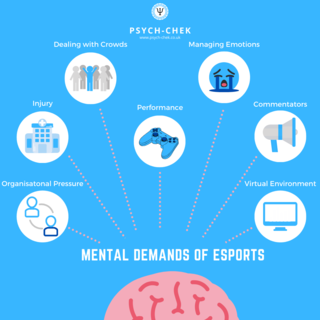Environment
What Are the Mental Demands of Esports?
Sports and esports are more similar than you think.
Posted May 18, 2020
In our previous post, we mentioned that we are normally asked: “How do traditional sports and esports differ?” Our answer: The psychological demands faced by esport athletes are surprisingly similar to those experienced by traditional sports athletes competing at the highest level. Here are a few examples of the psychological demands faced by esport athletes.

Psychological Demands
Performance: One of the most obvious demands is the pressure to perform. As an athlete, you are expected to perform to the best of your ability. At a high-level, you get paid because of your exceptional ability to consistently perform well. To no surprise, this is a demand experienced by esport athletes. These athletes are playing at the highest level, and some are battling it out for cash prizes of up to $3 million. You read it correctly. Esports athletes are competing for cash prizes similar, if not higher, to those awarded in traditional sports. The pressure to perform is most certainly present.
Dealing with crowds: Crowds are part of being a high-level competitor. The presence of a crowd has been stated as a demand for traditional sports athletes. Some esports events house very large crowds, such as ESL One Birmingham’s DOTA 2 event, holding 24,000-plus fans in Arena Birmingham. While other events have virtual crowds (i.e., stream viewers). Therefore, being able to perform optimally in the midst of a big and loud crowd is a demand in esports.
Regulating emotions: With competition comes emotions. Being in an environment where you are competing to achieve your goal can result in athletes becoming emotionally charged in certain situations, such as very close games. Within esports, the athlete needs to regulate their own emotions, especially during adversity. For example, when I (Edgar) attended the FIFA 19 Global Series Playoffs, I could feel the emotional atmosphere in the air. I witnessed that the better FIFA players were the ones who were able to keep their emotions in check during the tough times. Being unable to regulate emotions, such as being easily tilted (i.e., frustrated), can be a significant barrier for optimal performance.
Organisational pressure: When performing at a high level, athletes have reported that a demand of their sport is being able to manage stress from their sports organisation. This includes team selection, accommodation, finances, and travel. Like traditional athletes, these are issues faced by esport athletes. Working within esports I (Edgar) have heard of these experiences. There are stories of esport athletes dealing with financial contracts, traveling overseas, organising accommodation for tournaments, and facing team deselection.
Injury: A well-known demand for traditional athletes is dealing with and preventing injury. It’s known in traditional sports that it’s not a matter of if, but when you get injured (especially in high-level competition). Esports are no different. Although they’re not experiencing broken bones as a result of their sport, esports athletes can experience overuse injuries. These injuries occur from long practice hours (up to 10 hours a day), sitting in a chair, and being close to a monitor. A 2019 study found the most frequently reported complaints in gamers were eye fatigue, followed by neck and back pain. Highlighting injury management and its psychological effects are areas esport athletes need to manage. However, research in injury along with other psychological and physical demands in esports are scarce. Don’t worry, esports research is coming and will be posted on this blog.
Commentators: This may seem strange as most traditional sports athletes don’t normally deal with hearing event commentators during their performance. However, in esports, this isn’t always the case. In games such as DOTA 2 (Defense of the Ancients) and League of Legends, your headset prevents you from hearing most of what’s going on in the arena. However, when I worked in the recent FIFA eClub World Cup in Milan, Italy, some players weren’t so lucky. One player said, “I can hear what they [commentators] were saying when I scored.” Players who don’t play audio through their headphones or choose not to use headphones are able to hear the commentary. Therefore, being able to maintain task focus while hearing commentary is crucial for esport athletes.
Reduced control over a virtual environment: Esports requires performing in a virtual environment, meaning players have less control over their performance environment, compared to traditional sports. For example, when playing football on a physical pitch, you have a greater degree of control over your intended actions and action execution. In FIFA, you have a lower degree of control as your intended actions can be altered by lag (time delay between the action command and the action execution) or in-game glitches. Thus altering the action execution. Furthermore, in this virtual environment, you can experience disconnections, which you don’t experience during physical traditional sports performance. This results in a demand of esport athletes being able to maintain their optimal mental state and coping with moments of reduced control over their performance.
Final words
- Traditional sports and esports differ in performance task demands but share some psychological demands.
- There’s a need for more research looking at injuries in esports and how esport athletes can deal with its psychological impact.
- Managing emotions is a significant demand that all esport athletes need to address.
This post doesn’t cover all the demands an esport athlete faces but provides an introduction to the world of esports through a psychological POV. It’s important to remember that each individual game within esports, just like each individual game in traditional sports, differs in the psychological demands placed on the player. Esports also has its own unique demands, such as dealing with performing in a virtual environment, more frequent competitions, and a ‘toxic’ online culture, to name a few. Future posts will expand on these psychological demands.
Join us next time where we unpack the different psychological demands of team-based esports.




